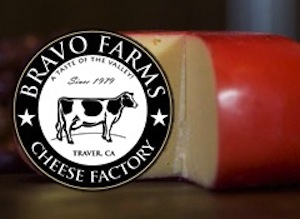D’Amico et al., report in the current Journal of Food Protection “that the 60-day aging requirement alone is insufficient to completely eliminate levels of viable E. coli O157:H7 in Gouda or stirred-curd Cheddar cheese  manufactured from raw milk contaminated with low levels of this pathogen.”
manufactured from raw milk contaminated with low levels of this pathogen.”
Bet Costco would have liked to know that before the outbreak linked to Gouda that has sickened at least 37 people in five U.S. states.
The complete abstract is below.
Behavior of Escherichia coli O157:H7 during the manufacture and aging of gouda and stirred-curd cheddar cheeses manufactured from raw milk
01.dec.10
Journal of Food Protection
D’Amico, Dennis J.; Druart, Marc J.; Donnelly, Catherine W.
http://www.ingentaconnect.com/content/iafp/jfp/2010/00000073/00000012/art00009
Abstract:
This study was conducted to examine the fate of Escherichia coli O157:H7 during the manufacture and aging of Gouda and stirred-curd Cheddar cheeses made from raw milk. Cheeses were manufactured from unpasteurized milk experimentally contaminated with one of three strains of E. coli O157:H7 at an approximate population level of 20 CFU/ml. Samples of milk, whey, curd, and cheese were collected for enumeration of bacteria throughout the manufacturing and aging process. Overall, bacterial counts in both cheese types increased almost 10-fold from initial inoculation levels in milk to approximately 145 CFU/g found in cheeses on day 1. From this point, counts dropped significantly over 60 days to mean levels of 25 and 5 CFU/g in Cheddar and Gouda, respectively. Levels of E. coli O157:H7 fell and stayed below 5 CFU/g after an average of 94 and 108 days in Gouda and Cheddar, respectively, yet remained detectable after selective enrichment for more than 270 days in both cheese types. Changes in pathogen levels observed throughout manufacture and aging did not significantly differ by cheese type. In agreement with results of previous studies, our results suggest that the 60-day aging requirement alone is insufficient to completely eliminate levels of viable E. coli O157:H7 in Gouda or stirred-curd Cheddar cheese manufactured from raw milk contaminated with low levels of this pathogen.
